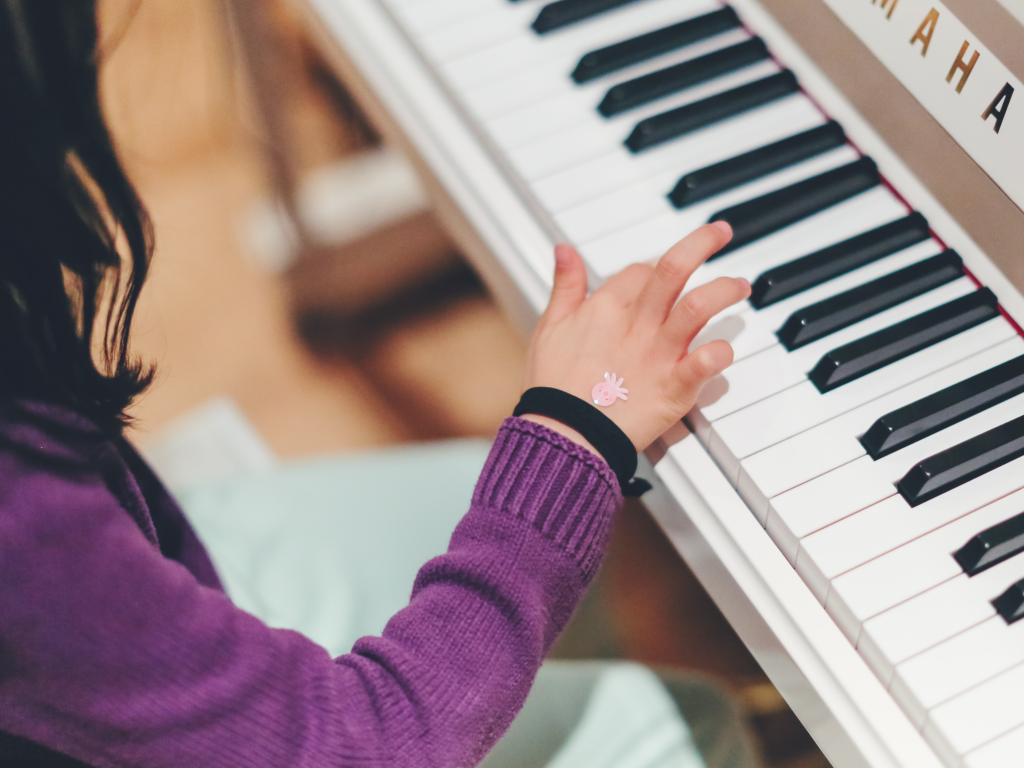
I started piano lessons when I was three or four, small enough that I remember having to climb up on the piano bench. My feet swung beneath me as I started learning how to read the keyboard and the sheet music in front of me. I’ve always felt learning music helped me grow in many ways. Think of everything that goes into it: the math skills to understand rhythms, chords, and harmony; the ability to collaborate with other musicians; the self-confidence to play a solo.
In fact, researchers have found that music enrichment may impact child development in important areas, from motor skills to social-emotional development. As Dennie Palmer Wolf, PhD, reports, “Making music is one of the most intense, multi-sensory, and physically involving activities in which young children engage.”
Read on for more on the evidence behind integrating music into your routine, as well as practical strategies from music therapist Jessica Lee.
Motor skills
Music and movement go hand in hand. Many children are naturally inclined to move when they hear a good beat. For young children, musical play can mean simple movements like dancing, clapping and stomping, or throwing a ball in time with a beat. Researchers have found that musical training is associated with changes in areas of the brain related to movement. It also strengthens connections between brain regions. Unsurprisingly, learning to play an instrument enhances fine motor abilities generally.
Cognitive skills and language ability
You can hear it in the rhythms and rhymes of nursery rhymes and lullabies: music and language are intrinsically linked. Research suggests a positive association between musical training and speech processing and language learning. Not only that, but at least one study found that kindergarteners who received keyboard instruction did better on arranging puzzle pieces and blocks to create different objects, suggesting a boost to spatial-temporal skills. Musical training may also enhance memory, increasing brain plasticity even in adults.
Social-emotional skills
Researchers have examined the impact of music enrichment on young children’s ability to regulate both positive and negative emotions. As the authors of a study of arts-integrated programming for low-income children reflect, “Experiences with the arts elicit a range of emotions, and may help children to understand connections between events and feelings, as well as practice appropriate strategies for emotion regulation.” One study of four-year olds even found that making music together seemed to increase “spontaneous cooperative and helpful behavior.” It makes intuitive sense: group music-making involves listening, taking turns, and coordinating with others to create a community of sound.
A sense of belonging
Music is a universal part of human culture. It offers the opportunity to share in a global community and to share one’s own culture with others. Students whose background differs from the predominant culture benefit from seeing their home culture reflected in the classroom. “In the field of music education, where creativity and personal expression are valued, it is especially important to address the disconnect that students may perceive between home and school cultures,” writes Kate Fitzpatrick, PhD, in “Cultural Diversity and the Formation of Identity: Our Role as Music Teachers.” Additionally, when given the opportunity to share elements of their home culture with their peers, children build agency and confidence in their identities.

Tips for working with young children

We reached out to Jessica Lee, a board certified music therapist, director of Ensemble Music, and parent, to learn ways in which early childhood practitioners (and parents) can integrate music into their routines.
“Music has a certain power that words can’t describe,” says Lee. “It connects us, soothes us, and improves our mood. Along with the joy that music brings us, it also helps promote growth in various developmental domains.”
Lee shared the following advice on supporting children’s growth through music.
Physical development
- Provide many opportunities for movements large and small.
- Think about giving children opportunities to move in all kinds of ways (left/right, forward/backward, up/down, unilaterally/bilaterally, etc).
- This helps children develop balance, spatial awareness, and fine and gross motor skills.
Cognitive development
- Sing songs that include counting, sequencing or telling a story (“Five Little Monkeys”, “This Old Man”, “I Know an Old Lady”, etc.).
- The rhythm and repetition in songs like these help children remember and anticipate number sequences and patterns, building early math and reading skills.
Self-regulation
- Leave out words or phrases in a song or provide opportunities in a song for “freeze” moments.
- Children learn what it feels like to resist doing something, helping them practice impulse control.
Prosocial skills
- Plan activities within a song that encourage children to work together.
- Movements like rowing, hand clapping patterns, and passing instruments give children an opportunity to work together and read others’ emotions, helping them develop empathy.
Leadership skills
- Give children an opportunity to pick a song or a movement for a song.
- Accepting and including their suggestions–even if they don’t always fit (think: a dog that says “quack”!)–encourages leadership skills and creativity.
- Children gain self-confidence when they feel their song interpretation is accepted by you.
Reminder: Have Fun!
In the decades since I picked out my first piano tunes, I’ve had the good fortune to try many different instruments, sing in choirs, and play in groups. I love playing with others, laughing at ourselves when we sound terrible and feeling elated when we’re in sync. I value my formal music education, but the most important part to me is simple enjoyment.
“The most important thing to know about doing music with children is that it has to be fun and playful,” says Lee. “Children learn from music engagement, not music talent, so no matter how ‘musical’ you perceive yourself to be, let the children in your life see you enjoy music. They are sure to join you and grow up knowing that music is for everyone!”
Jessica Lee is a board-certified music therapist working in an inpatient child/adolescent behavioral hospital unit, as well as the director of Ensemble Music, which specializes in early childhood music and movement classes in the Twin Cities. She is the proud mom to three wonderful children and feels fortunate to be able to make music with families every day.

